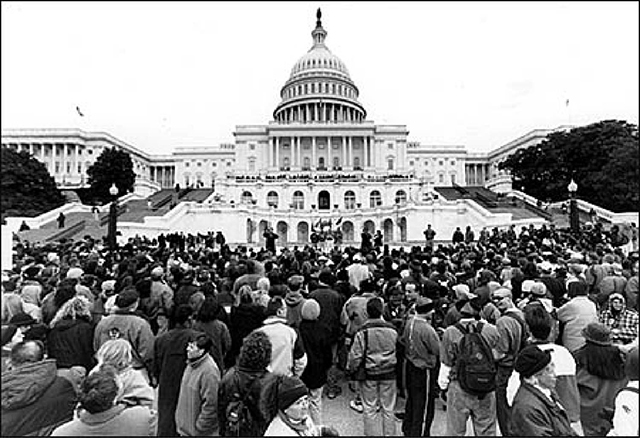1988: Debuts of the Computer Virus and the Jamaican Bobsled Team, Plus Gallaudet University and Student Activism

Microsoft continued its success in 1988 with their release of Windows 2.1, capitalizing on the Intel processors. The first major computer virus, the Morris worm, went mainstream, changing the way the world viewed Internet security. Mystery Science Theatre 3000 debuted on television, captivating sci-fi audiences in the Twin Cities. Stephen Hawking published, “A Brief History of Time: From the Big Bang to Black Holes,” bringing cosmology to the masses. And the stealth bomber was unveiled, showcasing a decade’s worth of development in defense technology.
Canada hosted their first winter Olympics in Calgary and battled tough weather with strong warm winds, delaying numerous events and forcing the alpine competitions to be held on artificial snow for the first time in Olympic history. Aside from the weather, these winter Olympic games boasted a substantial highlight reel. Among the most memorable moments were the Battle of the Brians, in which Brian Boitano narrowly beat out Canadian Brian Orser for the gold in men’s figure skating, and the historical debut of the Jamaican bobsled team (later immortalized in Disney’s 1993 movie “Cool Runnings”).
In higher education news, Dr. I. King Jordan was elected as the first deaf president of Gallaudet University, after a week-long student protest, known as Deaf President Now (DPN), shut down the campus. This was a landmark event in the deaf civil rights movement and highlighted the power and effectiveness of student activism. Gauging the pulse of incoming freshmen on activism in the fall of 1988, the CIRP Freshman Survey questioned students about participating in such events. When asked if they had participated in organized demonstrations within the previous year, over a quarter (27.3%) of students responded that they had “occasionally,” and another 7.7% did so “frequently.”
Students who identified themselves as liberal or far left were more likely to take part in demonstrations than conservative or far right students. Almost four out of ten (38.9%) liberal or far left students compared to about three out of ten (31.3%) conservative or far right students stated that they had “occasionally” or “frequently” participated in organized demonstrations during their last year in high school. Further, women were more likely than men to participate: 37.4% of women versus 32.4% of men indicated their participation.
When asked about the importance of being influential, students overall leaned towards influencing social values more than the political structure. Only 16.8% of students stated that “influencing the political structure” was a “very important” or “essential” goal; while more than twice as many students (37.1%) stated “influencing social values” was a “very important” or “essential”goal. The gap between political affiliations narrows when looking at these goals, with liberal and far left students valuing a bit more than conservative and far right students influencing the political structure (24.1% liberal/far left vs. 22.7% conservative/far right) and social values (43.2% liberal/far left vs. 38.9% conservative/far right) .
Although as a whole, the incoming class leaned towards influencing social values more so than influencing the political structure as a goal, when broken out by gender, men and women responded differently. Women were more likely to consider influencing social values as a “very important” or “essential” goal (40.7% of women compared to 32.7% of men), while men were more likely to consider influencing the political structure as a “very important” or “essential” goal (19.8% of men compared to 14.2% of women).
Did you know? 68.5% of incoming students had done extra (unassigned) work/reading for a class in the past year.
71% of incoming students “agreed somewhat” or “agreed strongly” that employers should be allowed to require drug testing of employees or job applicants.
41.8% of incoming students rated themselves as “above average” or “highest 10%” compared to their peers in popularity with the opposite sex.
